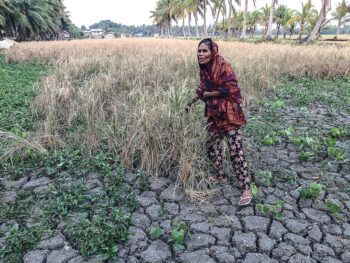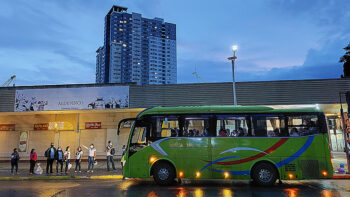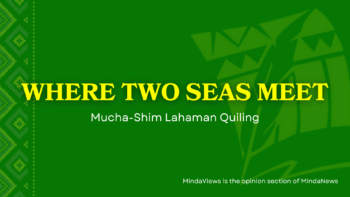 NAAWAN, Misamis Oriental (MindaNews / 02 September) – The virus is called by scientists as a thing on the “edge of life”. It’s not a living organism and by itself cannot reproduce and multiply. Yet it has the innate capacity to replicate its kind by hijacking or using the replication mechanism of a host cell of a living organism, say, in man, entering into the latter’s system through his movements and internal processes, such as in touching and breathing. Moreover, although without intelligence, it has the capacity to mutate or vary rapidly to adapt to changing situations. For instance, the Delta variant distinguishes itself from the original SARS-CoV-2 by its improved capacity to attach to the cells of a host.
NAAWAN, Misamis Oriental (MindaNews / 02 September) – The virus is called by scientists as a thing on the “edge of life”. It’s not a living organism and by itself cannot reproduce and multiply. Yet it has the innate capacity to replicate its kind by hijacking or using the replication mechanism of a host cell of a living organism, say, in man, entering into the latter’s system through his movements and internal processes, such as in touching and breathing. Moreover, although without intelligence, it has the capacity to mutate or vary rapidly to adapt to changing situations. For instance, the Delta variant distinguishes itself from the original SARS-CoV-2 by its improved capacity to attach to the cells of a host.
The outside or corona of a virus is covered with protein spikes. These are like grappling arms with different shaped hooks attached. In the case of the Delta variant, the hooks are found sharper and stronger than the original. And once a cell is snared, the spike protein arms fuse the virus with the cell which allows it to replicate faster than before through the host cell’s replication mechanism. That is why the lungs of a person infected with the variant have high viral load resulting to severe symptoms and rapid deterioration of the health of the victim. The high viral load causes the rapid transmission of the variant to new hosts, because when a victim coughs, sneezes or simply speaks, more virus comes out from him and infects those nearby.
The Delta variant was detected only in October 2020 yet it has caused catastrophic surges across the globe, causing more deaths from COVID-19 than before its advent.
Researchers at Columbia University Mailman School of Public Health used a computer model to estimate that the Delta variant is around 60 percent more contagious than the original SARS-CoV-2 virus and can escape immunity from prior infection roughly half of the time.
SARS- CoV-2 was only discovered in December 2019; yet, In less than two years five variants have already been detected emanating from it (Alpha, Beta, Gama, Delta and Iota) of which the Delta variant is found very aggressive in wrecking havocs so far.
According to virologists from Johns Hopkins University viruses have a mutation rate that’s much, much higher than humans or other animals, and they replicate at a rate that’s really, really fast. One virus-infected cell makes 100,000 copies of itself, and all those copies can go out and start replicating. So mutations occur randomly, but because the virus replicates at such a fast rate, mutations may also accumulate. More and more mutations, even from mutants themselves, are likely to occur that may come out with strains that can duck or escape the immunity generated in vaccination, therefore, several times infectious than the original.
We can’t prevent virus from mutating. What we can do is to limit its spread, and, in that way, we reduce the chance that a mutation can emerge that is going to help the virus infect humans better. Mass vaccination serves the purpose; it limits new hosts, reducing, thus, the total amount of virus replication and the possibility of more adaptive mutations.
The virus, though, is found to make ‘breakthrough infection,” that is to infect some of those already vaccinated. But infection of this kind is minimal compared to the infection of the unvaccinated.
Moreover, vaccines are still currently found highly effective in preventing severe disease from these infections. It is reported that 9 out of 10 COVID-19 patients in ICUs of Philippine hospitals are unvaccinated. In the US, 99 % of those who died from the disease are unvaccinated.
Thus, the public is encouraged to get vaccinated. Avoiding getting sick and curbing the spread of the virus is a social responsibility.
A person sick of the disease could spread the disease to the most vulnerable members of his family, the elderly and the very young and burden the family with his medical-financial troubles; he further overworks medical frontliners, if he manages to enter in-capacity healthcare facilities, and could infect others along the way.
More and more infections means longer lockdowns that may push the country to an economic disaster that could wipe out jobs and push people to hunger and starvation that may result to possible chaos and violence.
Those who oppose vaccination do not or refuse to recognize how their irrational selfishness impacts on society.
(MindaViews is the opinion section of MindaNews. William R. Adan, Ph.D., is retired professor and former chancellor of Mindanao State University at Naawan, Misamis Oriental, Philippines.)






